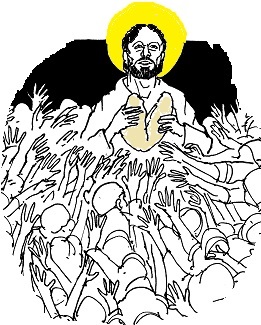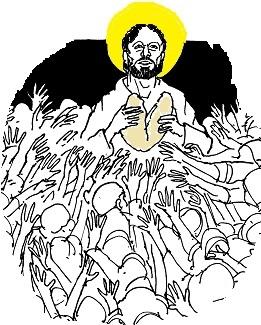

“Whoever eats my flesh and drinks my blood has eternal life” (John 6: 54).
Body and Blood of Christ
Deut 8:2-3, 14-16; Ps 1471 Cor 10:16-17; John 6:51-58
If the Incarnation is the linchpin of Christian theology, the Eucharist is its greatest sacramental expression. Jesus came among us as Word Incarnate, and he remains with us in time through the timeless gift of the Eucharist. By baptism we are incorporated into Jesus and become his Body in the world. Vatican II teaches that Christian worship is the summit and font of the life of the church. Thomas Aquinas called the Mass the “Sacred Banquet, in which Christ is received, the memory of his Passion is recalled, the soul is filled with grace, and the pledge of future glory is given us.”
The challenge of the Feast of Corpus Christi, the Body and Blood of Christ, is to translate this lofty and inspiring theology into our lived reality in the world. The centrality of the Eucharist grounds us in the flesh and blood of our humanity, where God is found, and calls us to become what we say we are, Jesus alive and active in the world. The mystery must be protected from either literalism or over spiritualization, and its sacramental character rescued from those who would turn Christ’s presence into a holy object to be worshiped and reserved only to the worthy.
This challenge was expressed once in a homily delivered in a midtown Kansas City church when the homilist said that any Corpus Christi procession through the neighborhood ought to begin by genuflecting to one other as the real presence of Christ. Vatican II affirmed this when it taught that Christ was not only present in the consecrated bread and cup, but also in the Word of God, in the presider and in the assembled community.
A silver monstrance held high and incensed by robed clergy, flanked by the Knights of Columbus and the faithful in procession singing sacred hymns is one expression of Catholic devotion to the Eucharist. So is the faith community that carries the death and resurrection of Jesus from the altar into the world in lives of service and the pursuit of justice.
St. Paul saw enormous implications in the Holy Communion of the church. When we break bread and share the cup, we are proclaiming that the death of the Lord has made us one. To receive this gift is to commit to one another in love, for we are members of one another, one body in Christ. We have been incorporated into his crucifixion and resurrection. We are one flesh with him and his blood flows in us, transfusing us to be a new Creation destined for divine life with God. It is a mystery so awesome writer Annie Dillard has said we ought to wear seatbelts and helmets when we attend Mass.
Jesus makes explicit this reality in John, Chapter 6. He is the bread of life, manna from heaven, the flesh of the Passover Lamb, the saving blood on the lintel, the unleavened bread for the Exodus to freedom. If Israel was once united to God by splashing the blood of sacrifice on the altar and then on the people, Jesus now unites us in himself in the most intimate way imaginable, by giving us himself as food. We become what we eat. It is total mystery requiring total assent, but if we receive this gift of total love, it will be for us nothing less than a pledge of future glory.
Advertisement








